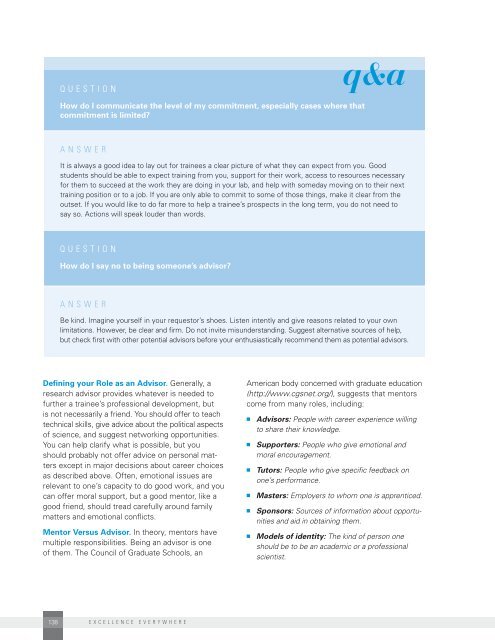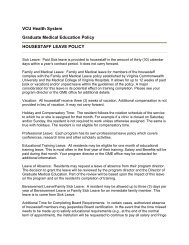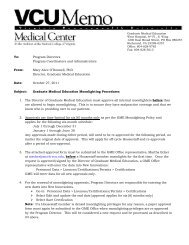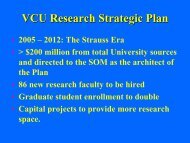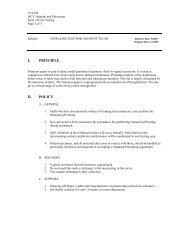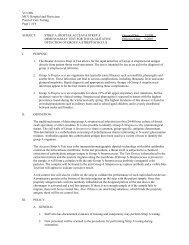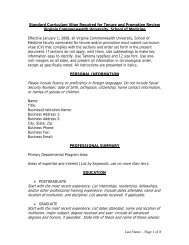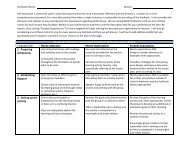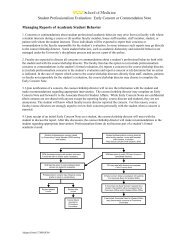Q u e s t i o nq&aHow do I communicate the level <strong>of</strong> my commitment, especially cases where thatcommitment is limited?answerIt is always a good idea to lay out for trainees a clear picture <strong>of</strong> what they can expect from you. Goodstudents should be able to expect training from you, support for their work, access to resources necessaryfor them to succeed at the work they are doing in your lab, and help with someday moving on to their nexttraining position or to a job. If you are only able to commit to some <strong>of</strong> those things, make it clear from theoutset. If you would like to do far more to help a trainee’s prospects in the long term, you do not need tosay so. Actions will speak louder than words.Q u e s t i o nHow do I say no to being someone’s advisor?answerBe kind. Imagine yourself in your requestor’s shoes. Listen intently and give reasons related to your ownlimitations. However, be clear and firm. Do not invite misunderstanding. Suggest alternative sources <strong>of</strong> help,but check first with other potential advisors before your enthusiastically recommend them as potential advisors.Defining your Role as an Advisor. Generally, aresearch advisor provides whatever is needed t<strong>of</strong>urther a trainee’s pr<strong>of</strong>essional development, butis not necessarily a friend. You should <strong>of</strong>fer to teachtechnical skills, give advice about the political aspects<strong>of</strong> science, and suggest networking opportunities.You can help clarify what is possible, but youshould probably not <strong>of</strong>fer advice on personal mattersexcept in major decisions about career choicesas described above. Often, emotional issues arerelevant to one’s capacity to do good work, and youcan <strong>of</strong>fer moral support, but a good mentor, like agood friend, should tread carefully around familymatters and emotional conflicts.Mentor Versus Advisor. In theory, mentors havemultiple responsibilities. Being an advisor is one<strong>of</strong> them. The Council <strong>of</strong> Graduate Schools, anAmerican body concerned with graduate education(http://www.cgsnet.org/), suggests that mentorscome from many roles, including:n Advisors: People with career experience willingto share their knowledge.n Supporters: People who give emotional andmoral encouragement.n Tutors: People who give specific feedback onone’s performance.n Masters: Employers to whom one is apprenticed.n Sponsors: Sources <strong>of</strong> information about opportunitiesand aid in obtaining them.n Models <strong>of</strong> identity: The kind <strong>of</strong> person oneshould be to be an academic or a pr<strong>of</strong>essionalscientist.138 excellence everywhere
In reality, it is unlikely that any one individual canfulfill all possible mentoring roles. For this reason,many argue that the term mentor should be usedbroadly to mean an individual who helps anotherwith one or more aspects <strong>of</strong> his or her personaland/or pr<strong>of</strong>essional development. In this sense,trainees are encouraged to seek out variousfaculty members who can provide some <strong>of</strong> thosecomponents.Strategies forEffective trainingMake Everything a Learning Opportunity. Ithelps to think <strong>of</strong> serving as a trainee’s advisoras a highly individualized mode <strong>of</strong> teaching (seechapter 8 for more information about teaching).Establishing a “culture <strong>of</strong> teaching” in your lab canhelp ensure that each individual feels empoweredto seek whatever information, education, or technicaladvice he or she needs to do good science.Set Specific Goals and Measures <strong>of</strong>Accomplishment. Work with each individual—when you meet formally to discuss the person’sprogress, in the course <strong>of</strong> lab meetings, and onother occasions when his or her work is underreview—to set specific goals and measures <strong>of</strong>accomplishment. For example:n For a student, you might want to establish apublishing goal. It should include deadlines.n For a more experienced scientist training in yourlab, job-hunting goals might be important. Youmight say, “By next month, give me your list <strong>of</strong>places you want to apply to. Then we can talkabout developing your job talk.”n Have technicians identify new skills they need(e.g., using new equipment or s<strong>of</strong>tware). Givethem time to learn and the opportunity to takecourses or seek help from others. Then ask themto demonstrate what they have learned at a staffmeeting.In some cases, you may have to push people a bitto set their goals. In other cases, people’s goalsmay be well-defined, but may not exactly fit yourlab’s overall goals. If you can, give them room toexplore options, and <strong>of</strong>fer whatever educationaland networking opportunities you can afford. Theywill be much happier and more productive whilethey are with you if they feel you are looking outfor them and their future well-being.Encourage Strategic Thinking and Creativity.Trainees in your lab, especially newcomers, maynot have the experience to judge how long tostruggle with an experiment or a project that isnot working. As the person steering the largerscope <strong>of</strong> the work, you must decide what projectsare most important, how long a given projectshould be pursued, and what resources can beallocated to any particular effort. As the boss, youshould communicate the basis and significance<strong>of</strong> your decisions to your trainees. You may feelthat you need not explain yourself to anyone, andthat may be true. But when you have made yourdecision, informing people why can be educationaland helpful to morale. It gives your trainees abetter understanding that although the decisionsare yours, they are not whimsical or unfair. In thisway, you give concrete examples <strong>of</strong> strategicthinking and prepare your trainees for the daywhen they may be in charge <strong>of</strong> their own researchprograms and face similar decisions.It is also important to give people enough spaceto be creative. Do not rush in too quickly withinterpretations <strong>of</strong> data or solutions to problems.Let your staff take the first stab. Be thoughtfuland ask probing and guiding questions that helpthem learn to be thinkers. By doing this, youprepare your trainees to work through projectsindependently, while at the same time you willbenefit from their insights and creativity.Uphold Pr<strong>of</strong>essional Standards. Those new toresearch are still forming their pr<strong>of</strong>essional standardsand habits. They will be working with youfor months or years and will learn your lab’s way<strong>of</strong> doing things. Set high standards for yourselfand your workers, and make sure your lab <strong>of</strong>fersan encouraging and disciplined environment.Experienced lab leaders list these essentials:n Encourage good time management techniques.At the same time, respect individual patterns <strong>of</strong>work. (See chapter 5, “Managing Your Time.”)n Clearly state your expectations. Let people knowwhen they are not meeting them.expanding your influence: training the next generation <strong>of</strong> scientists139
- Page 3 and 4:
A R e s o u r c e f o r S c i e n t
- Page 5 and 6:
Table of ContentsVII119PrefaceChapt
- Page 7:
135 Chapter 10E x p a n d i n g Y o
- Page 15 and 16:
Q u e s t i o nq&aWhat Is a “Tenu
- Page 17:
preparing for immediate submission,
- Page 22 and 23:
Practicing the Talkn Practice your
- Page 24 and 25:
your one-on-one interviews you have
- Page 26 and 27:
If talking directly about money is
- Page 28 and 29:
When the institution responds and y
- Page 30 and 31:
equipment and supplies. Maintenance
- Page 32 and 33:
Q u e s t i o nq&aIs your instituti
- Page 34 and 35:
Working With Human SubjectsWhether
- Page 36 and 37:
RESPONSIBILITIES BEYONDTHE LABORATO
- Page 38 and 39:
UNDERSTANDING YOURINSTITUTION AND H
- Page 40:
Criteria for PromotionStructure of
- Page 45 and 46:
Q u e s t i o nWhat’s in a Name?q
- Page 47 and 48:
Screening ApplicantsWhen you review
- Page 50 and 51:
Interpersonal Skillsn How important
- Page 52 and 53:
Multinational Organizations are hir
- Page 54 and 55:
n If there is an office that handle
- Page 57 and 58:
n Seek funding and publish papers (
- Page 59 and 60:
In fact, even though you yourself h
- Page 61 and 62:
n Craft a statement that you feel c
- Page 63 and 64:
n When you delegate authority to so
- Page 65 and 66:
n Use only pens, preferably with wa
- Page 67 and 68:
Strategy sessionsShould you decide
- Page 69 and 70:
Finding Good Papers for Journal Clu
- Page 71 and 72:
If possible, invite people in your
- Page 73 and 74:
Q u e s t i o nq&aHow do I avoid po
- Page 75 and 76:
The International Committee of Medi
- Page 77 and 78:
Managing Conflictin the LabConflict
- Page 79 and 80:
steps for dealing with conflictWhen
- Page 81 and 82:
chapter 5managing your time“ Succ
- Page 83 and 84:
Check your work: the 90-year though
- Page 85 and 86:
n Make and keep appointments with y
- Page 87 and 88:
n Help them seek advice without tak
- Page 89 and 90:
FAMILY MATTERSMany scientists face
- Page 91 and 92:
chapter 6project management“ We m
- Page 93 and 94:
My project is to get a grant funded
- Page 95:
ObjectivesObjectives are the end re
- Page 98 and 99: The key events schedule and the act
- Page 100 and 101: Microsoft Project, a program that s
- Page 102 and 103: Martin, Vivien. Managing Projects i
- Page 104 and 105: appendix II: Example of a Work Brea
- Page 106 and 107: appendix iv: Example of a Gantt Cha
- Page 108 and 109: e h i n d c l o s e d d o o r s :w
- Page 110 and 111: Who might be interested in supporti
- Page 112 and 113: Call your program officerProgram of
- Page 114 and 115: direct costs vs. indirect costsDire
- Page 116 and 117: RESOURCESAllen, Ernest M. “Why ar
- Page 118 and 119: the next generation of students (th
- Page 120 and 121: Seek Feedback through a Formal Peer
- Page 122 and 123: Encouraging Student Questionsn Do n
- Page 124 and 125: Here are some ways you can help the
- Page 126 and 127: n Are there curriculum changes unde
- Page 128 and 129: a relaxed format for talking about
- Page 130 and 131: spend in preparing an effective cou
- Page 132 and 133: The Publishing ProcessTypes of Jour
- Page 134 and 135: A word about impact factorsThe impa
- Page 136 and 137: C r e a t i n g a n i n t e g r a t
- Page 138 and 139: may need to take the first author p
- Page 140 and 141: submitting image filesToday, most i
- Page 142 and 143: Submitting your Paper to Another Jo
- Page 144 and 145: RESOURCESDavis, Martha. Scientific
- Page 146 and 147: increase your impact as a scientist
- Page 150 and 151: n Offer criticism and correction in
- Page 152 and 153: It is important to discuss career g
- Page 154 and 155: When Mentoring,Advisory, or Supervi
- Page 156 and 157: For researchers in developing count
- Page 158 and 159: n Is travel safe and convenient, or
- Page 160 and 161: n The expected contribution of each
- Page 162 and 163: Meetings. Set up systems to ensure
- Page 164 and 165: SPECIAL CHALLENGESFOR THE BEGINNING
- Page 166 and 167: e an important connection to future
- Page 168 and 169: The invention of a new method or pr
- Page 170 and 171: licensee, who can charge others for
- Page 172 and 173: Most profound for developing countr
- Page 174 and 175: Finally, the patents have been chal
- Page 176 and 177: And, India benefited as a supplier
- Page 178 and 179: paperwork involved in purchasing1.
- Page 180 and 181: labeling mattersA case in point: In
- Page 182 and 183: equipment, freeze-drying equipment,
- Page 184 and 185: Responsibilityfor materialsIf an or
- Page 186 and 187: Recent Improvementsin Materials Tra
- Page 188 and 189: “Knowledge is power.” —Sir Fr
- Page 190 and 191: MOUMemorandum of UnderstandingRFPRe
- Page 192 and 193: notes continued182 excellence every
- Page 194: notes continued184 excellence every


